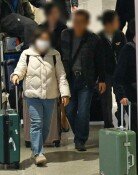Japans Fusosha History Book Distorts Chinese History As Well
Japans Fusosha History Book Distorts Chinese History As Well
Posted April. 18, 2005 23:30,
According to the Japanese Education Ministrys revision table that the newspaper acquired yesterday, it was revealed that China-related history distortions are also serious in the sanctioned version of Fusoshas middle school history textbook.
The distorted parts that the Chinese government requested a revision in 2001 are virtually left unrevised.
Among the 124 parts that the Japanese Education Ministry judged excessive and ordered Fusosha to revise, the major ones are:
Japanese Pirate Raiders-
Giving an account of 16th century Japanese pirates, Fusosha stated that most of them were Chinese. In other words, it denied the term Japanese. It tried to conceal Japanese pirating by including Koreans and Chinese among Japanese pirates.
Anti-Japanese Movements-
When Japanese militarism nakedly revealed its barbaric greed of invading the main continent in the 1920s, anti-Japanese movements arose among Chinese. Ignoring that historical backdrop, Fusoshas textbook only emphasized damages done to Japan like boycotts against Japanese goods and assaults on Japanese people. In addition, it described the Allied bombing raid on Tokyo during World War II, the dropping of nuclear bombs, Japanese POW detainments in Siberia, and many others in a similar way, stressing Japans damages only.
The 21 Demands-
When World War I broke out in 1914, Japan occupied German-dominated Qingdao with the Anglo-Japanese alliance supporting it. When the international community pressed Japan to withdraw, Japan suggested 21 demands as conditions for its withdrawal including the concession on the right to build railways in Shandong Province. Fusoshas textbook asserted that the 21 Demands were not contrived but desired, and stressed only the trivial fact that China promised to keep the demands secret, but broke it.
Manchukuo-
There is a statement in Fusoshas history book that Japan actively assisted Manchukuo, which was established in 1932, and contributed greatly in developing its economy. It was the Japanese Army that actually ruled Manchukuo then, and Japanese enterprises like Manchul that dominated Manchukuos economy. It did not contribute to the economic lives of the masses, but tried to conceal the reality that it contributed to Japans invasion of China.
Sino-Japanese War-
Fusoshas textbook completely blames the Chinese for the Lugouqiao Event in which the Chinese and Japanese armies clashed near the suburb of Beijing, Lugouqiao, on July 7, 1937. Despite a bilateral agreement for a cease-fire, imperialistic Japan embarks on its invasion of China in earnest by augmenting its forces with three divisions, asserting that the Lugouqiao event was Chinas premeditated provocation four days from the event. In other words, the textbook justifies Japans aggression.
Nanjing Massacre-
After occupying Nanjing in December 1937, the Japanese military massacred 200,000 Chinese POWs and civilians over six weeks. The post-war International Military Tribunal for the Far East also confirmed that the buried corpses alone account for 150,000 bodies. Nevertheless, Fusoshas textbook discusses the controversy over the number killed and raises questions whether the massacre even happened or not.
Others-
In March 1940, Japan established a puppet government in Nanjing. Nonetheless, Japans history book distorts this fact by describing it as if the Chinese set up the government to oppose the Kuomintang. The textbook states that when imperialistic Japan opened the Asia-Pacific Conference to justify Japans Asia invasion in 1943, the Nanjing government participated as the Chinese delegate. It also stated that Burma (todays Myanmar) and Philippines became independent, and that Japan recognized Indias interim government as a result of the conference. In other words, it implied that Japans war was not an invasion of Asia, but a liberation war for colonies.
Hun-Joo Cho hanscho@donga.com







